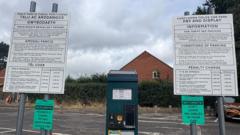Will New Parking Changes Push Customers Away? Traders Weigh In

Plans to Cut Free Parking in Cardiff: A Controversial Proposal
The recent proposal by Cardiff council to reduce free parking has sparked significant concern among local traders and residents. Initially, the council planned to eliminate free parking entirely in several areas, but after an outcry from shop owners, café operators, and the community, the proposal was amended to allow just 30 minutes of free parking. This change has raised questions about the potential impact on foot traffic and local businesses, as traders fear that it could drive customers away.
The Impact of Reduced Free Parking on Local Businesses
Local business owners argue that reducing free parking will deter visitors from coming to the area. Geoffrey White-Park, owner of Café Castan in Llandaff Fields, expressed his concern, stating, "Why should they impose money to park on what is a free amenity? They should be creating more parking, not penalising people for using what's here." His sentiment is echoed by many who believe that free parking is essential for attracting customers.
The council’s rationale behind this decision is to improve turnover in busy areas and encourage walking and cycling. However, many local traders see this as a misguided approach that fails to consider the needs of the businesses struggling to survive in a competitive retail landscape. With more people opting for out-of-town retail parks offering free parking, the potential loss of foot traffic could be detrimental to high street shops.
The Consultation Process and Community Response
The proposed changes are part of an updated Traffic Regulation Order, which is currently under consultation until September 4. Traders and residents are encouraged to voice their opinions, but many feel that the council has already made up its mind without adequately considering their feedback. Llandaff councillor Sean O'Driscoll, who supports maintaining the two-hour free parking, views the 30-minute allowance as a "small victory" but believes it is still insufficient for the needs of local businesses.
O'Driscoll stated, "People need to visit pharmacies, surgeries, shops, local businesses. It supports businesses when they need it most." This highlights the essential role that convenient parking plays in the local economy, particularly for small businesses that rely heavily on walk-in customers.
Concerns Over Footfall and Economic Viability
Zohaib Hassain, head of the Cowbridge Road East Traders Association, has been vocal in opposing the removal of free parking. He argues that businesses have already seen a dramatic drop in revenues, with reports of a 40-50% decline since the proposal was announced. He emphasizes that the lack of free parking is pushing customers towards retail parks, where they can park without charge.
Hassain's concerns raise an important point about the economic viability of high streets. With the rise of online shopping and the convenience of out-of-town shopping centers, traditional high street retailers are already facing significant challenges. Adding parking fees could further exacerbate these issues, making it harder for local shops to compete.
Proposed Changes and Their Implications
The council has proposed several amendments as part of the parking changes, including reduced charges on Sundays, an expanded season ticket scheme, and increased rates for longer-stay parking. While these measures aim to enhance the overall parking experience, they may not adequately address the immediate concerns of local businesses struggling with decreased foot traffic.
By limiting free parking to just 30 minutes, the council is attempting to manage parking space turnover. However, this brief window may not be sufficient for customers who wish to shop or engage with multiple local businesses, particularly those that require longer visits for services such as appointments, dining, or shopping.
The Importance of a Vibrant High Street
The discussion around parking fees raises fundamental questions about the value of a vibrant high street. Businesses like cafés, pharmacies, and local shops contribute significantly to the community's social fabric. They provide not just goods and services, but also a sense of place and community engagement. As Mr. Hassain pointed out, "The council needs to see the social value of the high street - it's not just about revenue." This perspective underscores the need for planning that supports community well-being alongside economic considerations.
Encouraging Sustainable Practices
While the council's intent to encourage walking and cycling is commendable, it is crucial to balance sustainability with the practical needs of local businesses. Implementing measures that promote sustainable transportation should not come at the cost of driving customers away from the high street. Instead, a comprehensive approach that includes ample free parking, improved public transportation options, and cycling infrastructure could foster a more supportive environment for both consumers and businesses.
Potential Solutions to the Parking Dilemma
To alleviate the negative impact of reduced free parking, several potential solutions could be considered:
- Increased Free Parking Duration: Extending free parking to one hour or more could provide customers with enough time to shop or dine without feeling rushed.
- Free Parking Days: Implementing designated days where parking is free could incentivize more visitors to the area.
- Community Engagement: Continuing to engage with local business owners and residents during the consultation process can help the council make informed decisions that benefit everyone.
- Promotional Events: Organizing community events or markets can draw foot traffic to local businesses, making them more resilient against parking fee changes.
Conclusion: The Road Ahead for Cardiff's High Streets
The potential cut to free parking in Cardiff has ignited a passionate debate about the future of local businesses and the viability of high streets. While the council aims to improve turnover and encourage sustainable practices, the concerns of traders and residents cannot be overlooked. As Cardiff moves forward with this proposal, it is essential to find a balance that supports both the economy and the community's needs.
As the consultation period continues, the future of Cardiff's high streets hangs in the balance. Will the council reconsider its approach to free parking in light of local concerns, or will the drive for sustainability and improved turnover prevail? The answer may shape the landscape of Cardiff's retail environment for years to come.
FAQs
What are the proposed changes to free parking in Cardiff?
The proposed changes include reducing free parking from two hours to 30 minutes in several areas, along with other amendments like reduced Sunday charges and increased rates for longer stays.
How have local businesses reacted to the parking changes?
Many local businesses have expressed strong opposition, arguing that the reduction in free parking will deter customers and further harm their already struggling revenues.
What alternatives might the council consider to support local businesses?
The council could consider extending free parking duration, implementing free parking days, or organizing community events to boost foot traffic in local areas.
As these discussions unfold, it’s crucial to reflect on how decisions regarding parking can impact not just commerce but the very character of our communities. How can we ensure that our high streets remain vibrant and accessible for everyone? #CardiffParking #LocalBusiness #HighStreetRevival
```Published: 2025-08-15 11:20:23 | Category: wales



